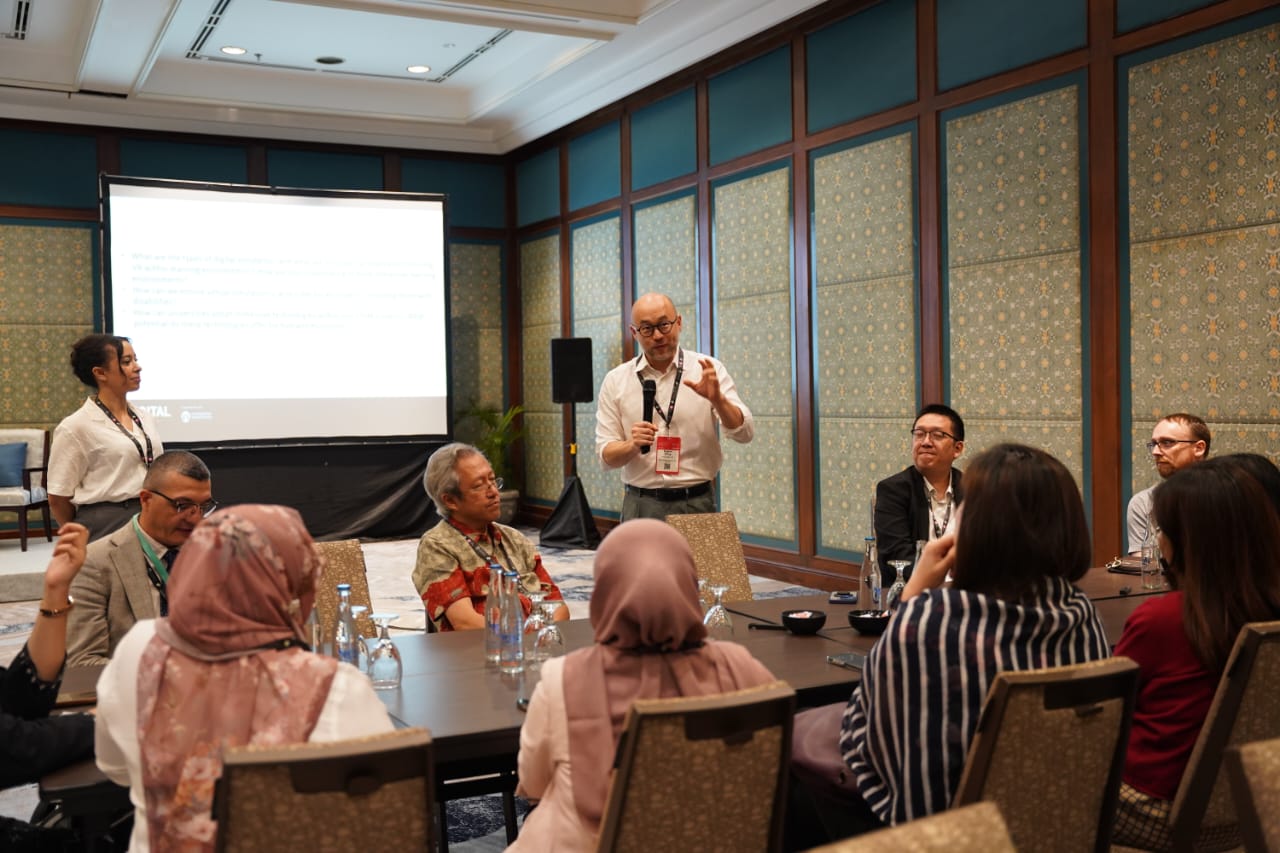Saleh Husin, Minister of Industry of Indonesia for the 2014–2016 period, who is also Chair of the Board of Trustees (MWA) of Universitas Indonesia for the 2019–2023 period, received a doctorate from the School of Strategic and Global Studies (SKSG) UI. He successfully defended his dissertation and achieved a summa cum laude GPA of 3.96. The promotion session was chaired by the Director of SKSG UI, Athor Subroto, S.E., M.M., M.A., Ph.D., with Prof. Dr. Chandra Wijaya, M.Si., M.M. as Promoter, Dr. Drs. A. Hanief Saha Ghafur, M.S. and TM Zakir Machmud, Ph.D. as Co-Promoter.
The examining team consists of Dr. Fibria Indriati Dwi Liestiawati, S.Sos., M.Sc.; Muliadi Widjaja, Ph.D; Mohamad Dian Revindo, Ph.D; Muhammad Syahroni Rofii, S.H.I., M.A., Ph.D. The doctoral promotion held at Makara Art Center UI and was attended by the Vice President of the Republic of Indonesia for the 2004-2009 and 2014-2019 periods, Dr. H. Muhammad Jusuf Kalla; Chairman of the Presidential Advisory Council, TNI General H. Wiranto; Constitutional Court Judge, Dr. Arsil Sani and the Deputy Chairmen of the People’s Consultative Assembly (MPR), including Dr. Lestari Moerdijat, S.S., M.M; Dr. H. Jazilul Fawaid, SQ., M.A; and Prof. Dr. Sjarifuddin Hasan., M.M., M.B.A. Meanwhile, from UI, among others, Chairman of the Board of Trustees, Dr. (HC) Noni Purnomo., B.Eng; Vice Chancellor for Academic and Student Affairs, Prof.Dr. rer Nat Abdul Haris; Deputy Chancellor for Human Resources and Assets, Prof. Dr. Ir. Dedi Priadi, DEA; and the Chancellor of UI for the 2014-2019 period, Prof. Dr. Ir. Muhammad Anis, M. Met.
Saleh Husin raised the topic “Downstreaming the Palm Oil Industry to Strengthen the National Economy and Improve Indonesia’s Bargaining Position in World Trade” as his dissertation study. He believes that Indonesia is the world’s largest producer and consumer of palm oil. Palm oil is also the main export commodity for Indonesia.
The export value of palm oil in 2021 was US$ 28,606 million, an increase of 55.10% compared to 2020. This increase has an impact on Indonesia’s national resilience economically and globally.
Unfortunately, Indonesia’s bargaining position in the international palm oil trade is still relatively weak. Even though Indonesia produces a lot of crude palm oil, the benchmark price is determined by the Malaysian and European exchanges (Rotterdam). Besides, Indonesia faces many challenges to compete in the global market, such as low national palm oil productivity and anti-palm oil campaigns from European countries. Therefore, the right strategy is needed to improve its bargaining position in the global market and the palm oil industry downstream.
Downstreaming is the process of processing raw materials into ready-to-use goods. In the palm oil industry, downstream refers to the processing and refining of crude palm oil (CPO) into higher-value products, such as refined, bleached, and deodorized palm oil.
This processing is the final stage of the palm oil supply chain before the product is sold to end users. The palm oil downstream industry segment includes products used in the food industry, such as cooking oil, margarine, and shortening, and non-food products, such as soap, detergent, and biodiesel.
Downstreaming the palm oil industry can strengthen the national economy by increasing the added value of export products and reducing imports. Domestic downstreaming requires more upstream products, so exports of upstream products can decrease. The simulations carried out in this dissertation show that if exports of upstream products decrease by 5% and exports of downstream products increase by 15%, it is estimated that Indonesia’s foreign exchange will increase by 7 billion USD per year. Thus, the Gross Domestic Product, an indicator of economic growth, will also increase.
Apart from that, downstream can improve productivity and improve independent palm oil farmers. Independent oil palm farmers control 42% of oil palm land in Indonesia, but their production is only 2-3 tons per hectare per year, which is still far from large plantations, which reach 5-7 tons per year. The quality of the fresh fruit bunches (FFB) produced is also lower, so the prices paid to farmers are lower. Therefore, downstream is needed so farmers can make palm oil with higher standards.
“Fertilizer subsidies, technical guidance, and other assistance need to be provided to independent farmers so they can produce products of the same quality as those produced by plasma farmers and large plantations and sell them at high prices, the same as oil palm plants from large plantations. ,” said Saleh.
Downstreaming the palm oil industry can also improve Indonesia’s bargaining position in world trade. According to Saleh, buyers of Indonesian palm oil consist of two groups: buyers who meet domestic needs, such as India and China, and buyers who resell to other countries, such as Malaysia and the Netherlands. Countries that resell Indonesian palm oil products make huge profits. With downstream, Indonesia can reduce exports to palm oil trading countries without reducing national production.
The downstream of the palm oil industry in Indonesia must continue with the 2015–2035 National Industrial Development Master Plan, along with its elaboration regulations. The implementation of this program has been accelerated so Indonesia can build new industries that use palm oil as the main raw material, such as the cosmetics, soap, chocolate, and biodiesel industries.
Saleh said, “Downstreaming will be successful if appropriate palm oil export regulations and taxation support it. An instrument is needed to reduce upstream product exports and increase downstream palm oil product exports. Indonesia also needs to increase cooperation with palm oil-producing countries, especially in ASEAN, regarding research and development of downstream palm oil products. Investors who produce palm oil derivative products can be invited to set up factories in Indonesia and export these products, provided that this investment is more profitable.”
Moreover, the downstream program will run if it is supported by the success of the Indonesian CPO Exchange that was launched on October 13. The government needs to provide incentives for palm oil companies that transact on the Indonesian CPO Exchange so that palm oil sellers and buyers are comfortable transacting at this institution and are willing to move their transactions from the Malaysian and Rotterdam exchanges.
The Indonesian CPO Exchange must be able to provide benefits for palm oil farmers. Through price and transaction transparency, entrepreneurs can no longer suppress the price of FFB, and farmers can sell their FFB on this exchange. The successful use of the CPO exchange for the benefit of farmers depends on their ability to manage risks and participate in the market. Therefore, education and training are important components that the government must provide.



